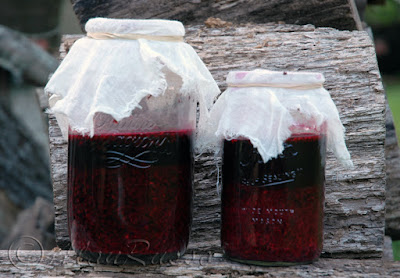( http://ethnobotanist128.blogspot.com/2011/08/elder-berries.html ) than I hope I will need this winter. So, what to do with the rest of the berries?
I have been interested in Lacto- Fermentation and Wild fermentation for a while now though I don't do as much of it as I should. Fermenting vegetables helps bring healthy probiotics into your diet and helps preserve edibles for a longer shelf life. I got a ton of Cucumbers this year and of course they came all at once. I pickled some in organic apple cider vinegar for long term storage but Lacto-fermented the rest.
I have a great book called Wild Fermentation that I have used in the past to make Vinegar out of the skins of organic Pineapple and the scraps of other fruits. The vinegars came out great with almost no effort on my part, the wonderful world of microbes floating through the air did all the work.
So, this light goes off in my head, 'how about making vinegar out of the extra Elder Berries'! I figured I would kill two birds with one stone. I would get some unique vinegar and I would get the medicinal value of the Elderberries every time I used it. People who can't use alcohol for one reason or another make Medicinal Tinctures out of Vinegar. So rather than soaking the berries in vinegar why not make vinegar directly from the berries!
I went to the Wild Fermentation book to refresh my memory on the procedure as it has been awhile since I have made Vinegar. I proceeded to smash up the Elder Berries in a bowl than added them to a couple of mason jars. Next I made the sugar solution., 1/4 cup organic sugar to a quart of water. I added the organic sugar solution to the berries being sure to cover them with the solution. Next, I simply cover the jar with cheese cloth and let sit on the kitchen counter, stirring every so often, for as long as it takes to get vinegar.
From my experience in previous vinegar making, the longer it sits, the clearer the liquid will become.
So, you are wondering how it tastes! Well, I have to admit it isn't the best vinegar I have made. If you have ever tasted ripe Elder Berries you know they have a weird almost nauseating taste to them. Drying them helps the taste a bit but they are not berries you can eat a handful of and want to come back for more. The vinegar has a slight hint if that aftertaste. I wonder if it would help if the vinegar was made from dried berries instead. Luckily I love sour stuff and respect the berries for their medicinal value. I can't wait to try it in some in a salad dressing.
Peace




